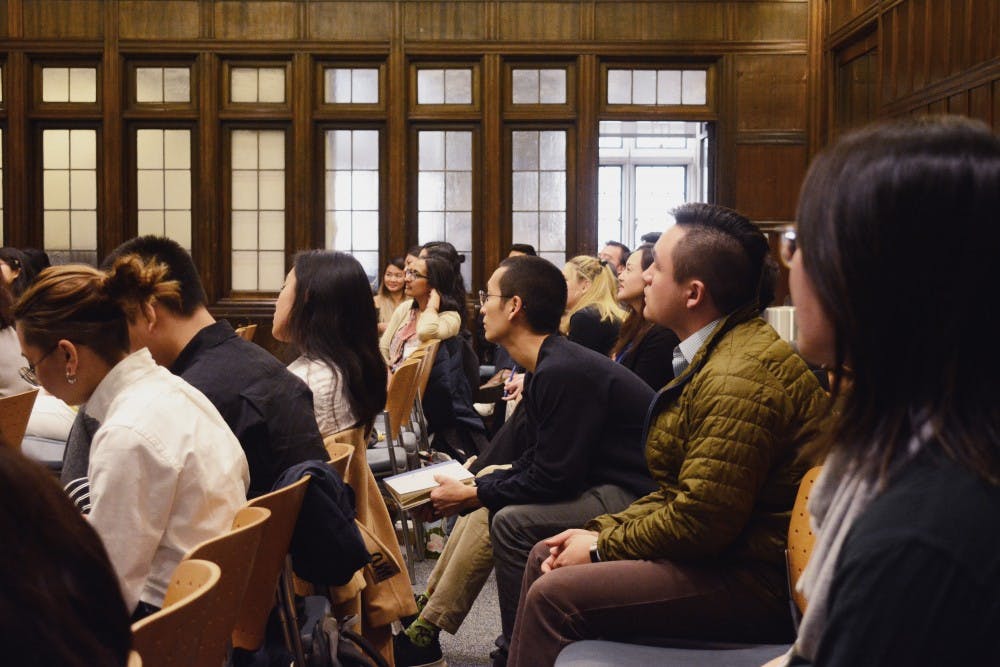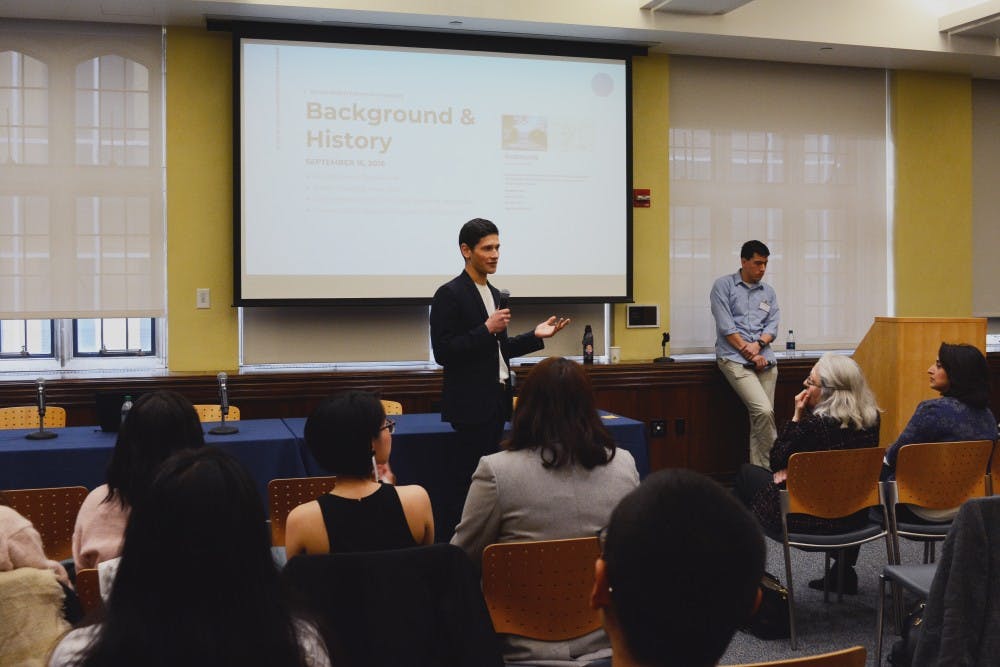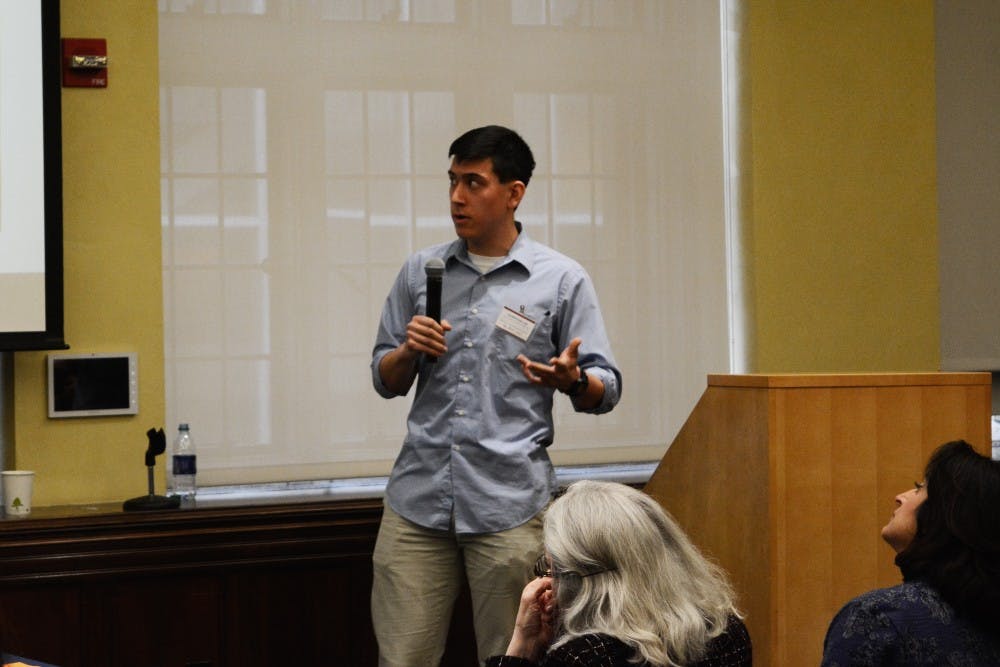
Students and faculty from universities across the East Coast gathered on Penn's campus for the "State of Asian American Studies Summit." The day-long conference was dedicated to building intercollegiate networks, sharing resources, and advocating for academic programs focused on the experiences of Asian American people.
In the ARCH building, Penn’s Asian American Studies Program and the ASAM Undergraduate Advisory Board hosted the March 22 summit, which included discussions on building sustainable Asian American Studies programs, how South Asian identity fits within ASAM, and the implications of the viral Facebook group, “subtle asian traits."
Speakers from various colleges, including Harvard University and the University of Florida, traveled to present at the event. Between panels and guest lectures, attendees broke out into workshops to discuss the obstacles facing Asian American Studies initiatives at universities nationwide.
Joshua Jiang (left) and Harrison Lee (right) gave a presentation titled "Fissures in Fatalism: Deconstructing Asianness in MASH".
Helen Yang, a senior at Duke University, is director of the college's Asian American Studies Working Group, which worked to establish an Asian American Studies program at Duke in 2018. At the keynote panel, titled "Building a Movement: Stages of Asian American Studies Program Building," Yang emphasized the need for greater institutionalized support for Asian American Studies programs.
"If you don’t know the Asian-American history and you haven’t read the Asian-American literature, it’s like this feeling that lives and breathes inside of you but can’t speak to you," Yang said.
Students and faculty agreed that one of the major obstacles is working with university administrations, which are not fully supporting Asian American Studies programs.
Sociology professor Grace Kao, who was a tenured faculty member and former longtime ASAM director, left Penn in 2017 to begin working at Yale University. In light of Kao's departure, student protests sparked across campus, which called on Penn's administration to give the shrinking ASAM program more support and funding.
ASAM UAB co-chair and College senior Trinh Nguyen emphasized that as a program, ASAM is not its own academic department and receives less resources.
ASAM UAB co-chair and College senior Luke Kertcher added that the UAB had to wait several months to schedule a 30-minute meeting with an administrator to discuss increasing University support for the program, which currently does not have a permanent director.
"I think my biggest frustration with the administration at Penn is this feeling that we’re being waited out," Kertcher said.
Nguyen and Kertcher began organizing the summit in fall 2018. ASAM typically sponsors conferences related to Asian American identity, Nguyen said, such as a conference in February on "Questioning Asian American Bodies."
Harrison Lee presenting at the State of Asian American Studies Summit.
English Undergraduate Chair Josephine Park has been ASAM interim director since fall 2018. The role was previously held by History professor Eiichiro Azuma. Park said the program has since been investing resources into increasing their course offerings, noting the recent hiring of full-time ASAM senior lecturer Rupa Pillai.
"We’re actually able to offer Intro to Asian American Studies" Park said. "It’s crazy. We haven’t been able to offer that because all of our faculty come from different departments that have teaching obligations."
After the "New Brown America" workshop, ASAM Associate Director Fariha Khan spoke about the complexities within Asian American groups and said it is important to "understand the diversity across all levels, not just in terms of ethnic terms, not just in terms of race, but also in terms of socioeconomic level."
Penn students also reflected on the impact ASAM courses have had on their own self-identity.
"I'm adopted and I grew up in rural Pennsylvania, so I actually didn’t really start identifying as Asian or Asian American until I came to Penn and started taking ASAM classes," College sophomore Erin O'Malley said. "For the first time in my life I was surrounded by Asians, so I had to deal with that. Taking classes in ASAM really helped me figure out who I want to be and why I want to be that."
Park stressed the need for colleges to value ASAM programs as a way to capture the history and experiences of Asian American people.
"We need Asian American studies," Park said. "It’s hard to imagine a time when we would need it more."
The Daily Pennsylvanian is an independent, student-run newspaper. Please consider making a donation to support the coverage that shapes the University. Your generosity ensures a future of strong journalism at Penn.
Donate




